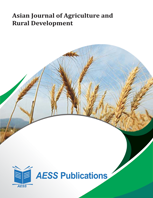
Print ISSN: 2304-1455
Peer Review Policy
Our peer review policy has three main features:
- This policy is designed to evaluate the validity and quality of articles prior to publication. This supports the maintenance of the integrity of the knowledge domain to which the articles belongs and filters out irrelevant and poor-quality manuscripts (Eysenbach &Till, 2001).
- Our peer reviewers ensure that data is clearly presented and findings and conclusions are adequately supported by data.
- We follow the double-blind review process, which means neither authors nor reviewers are aware of each other’s identities or affiliations throughout the review process. Authors are instructed to prepare their manuscripts in such a way that their identities are not revealed. This anonymity prevents bias from either side.
Regarding plagiarism, replication, and duplication, we adhere to the COPE guidelines. In addition, as a Crossref member, Asian Journal of Agriculture and Rural Development (AJARD) uses similarity checking tools recommended by Crossref. To ensure the originality of content, AJARD uses iThenticate software, a powerful, user-friendly tool, to detect plagiarism.
Additionally, in order to ensure publication ethics are applied throughout the peer review process, AJARD has clear and distinct policies for conflict of interest, human rights, and informed consent (COPE, 2011, 2015). To comply with the guidelines set out by COPE, we require authors to clearly state any conflict of interest regarding financial and non-financial matters. In cases where human subjects are involved, or if any research shows human health intervention, AJARD requires authors to submit their research for approval to their institutional ethics committee or review board. AJARD also ensures that authors have obtained informed consent from the participants, who are permitted to opt out of the research process at any stage. See publication ethical guidelines of AJARD for more details: http://www.aessweb.com/journals/5005/info/pe.
Our research articles, therefore, convey scientific validity and compatibility with state-of-the-art knowledge. The articles are not only comprehensible but also offer a valuable contribution to the knowledge domain.
References
Committee on Publication Ethics (COPE). (2011, March). Flowcharts on how to handle common ethical problems. Retrieved from
http://publicationethics.org/files/Code_of_conduct_for_journal_editors_Mar11.pdf
Committee on Publication Ethics (COPE). (2015, November). Flowcharts on how to handle common ethical problems. Retrieved from
https://publicationethics.org/files/cope-publication-ethics-flowcharts-full-set.pdf
Eysenbach G and Till JE (2001). Ethical issues in qualitative research on internet communities. The BMJ, 323: 1103-1105. https://doi.org/10.1136/bmj.323.7321.1103
https://www.crossref.org/services/similarity-check/



